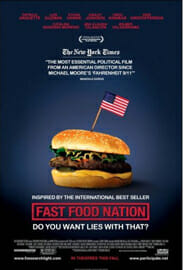
Director/Writer: Richard Linklater
Starring: Patricia Arquette, Bobbe Cannavale, Ethan Hawke, Ashley Johnson, Greg Kinnear
Studio info: Fox Searchlight Pictures, 116 mins.
There are exceedingly few movies that would’ve been more artistic super-sized, if half as effective, politically. But there aren’t many movies like Fast Food Nation, either. Pulling from journalist Eric Schlosser’s modern muckraking classic, Schlosser and veteran director Richard Linklater boil characters and plots from the book’s facts, figures and footnotes into a stark, sprawling examination of the American interior.
Like Steven Soderbergh’s Traffic, Fast Food Nation juggles cross-cultural plots. And though Linklater and Schlosser have cited Sherwood Anderson’s Winesburg, Ohio as an influence, John Dos Passos’ U.S.A. trilogy might be more appropriate—the latter’s characters churning toward their cultural fates and occasionally crossing paths. Linklater—who massaged poise from disconnected throughlines in Waking Life and Slacker—has no trouble making sense of it.
“I know their type,” an appropriately grizzled Kris Kristofferson grumbles as a veteran rancher. There are lots of types in the fictional-but-recognizable Cody, Colo.: the advertising exec (Greg Kinnear), the single mother (Patricia Arquette), Mexican laborers (among them haunting Maria Full of Grace star Catalina Sandino Moreno), teens working at the fast-food joint (including Ashley Johnson). Beside their tasks in the plot, each is responsible for acting as a surrogate for the absent investigative reporter, occasionally switching into “message” mode. “Not all of us can get hired at the Banana Republic,” reminds one of the pimply-faced burger-flippers, sneering.
The plots themselves—mothers and daughters, immigration narratives, the morality of advertising, idealistic youth—are modest in an indie-film kinda way, with blunt walk-on monologues from Bruce Willis, Kristofferson and others. Immensely dark, Fast Food Nation often teases like a thriller, like something terrible could happen at any moment—which, of course, it eventually does, and quite graphically.
This, perhaps, is where the film stumbles. In its effort to demonstrate how bloody awful everything is, the stories begin to evaporate, leaving only a grease ring of morality. Kinnear disappears three-quarters of the way through, his plot only resolved as an afterthought. The illusion that the story was somehow about his character shattered, it’s here that one wishes Linklater and Schlosser followed through with everything they began, and then some.
At double the length and with twice as many characters at their disposal, the pair might’ve delved deeper into other issues Schlosser explored in the book—advertising strategies, the health risks of fast food, environmental depredation—and made a more sweeping film. But whether four hours or two, there would’ve been equally little redemption. The ending is obvious before the film starts: fast food wins and no character will ever be able to cope with the bigger picture (short of introducing Schlosser’s book itself into the story in a Charlie Kaufman-like twist). No plot Schlosser and Linklater could concoct could change that.
For all its flaws and sensationalism, though, Fast Food Nation remains steadfastly apolitical. Mexicans cross the border, they imply. It happens. Policies are illusory. Meat might be murder, but the cows aren’t revolting. Schlosser and Linklater are happy to ask questions that no longer have answers. Would you like fries with that?